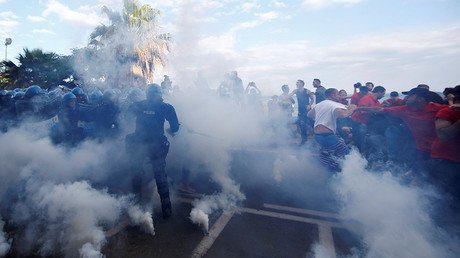'We are giants, you are the seven dwarves!' : Clashes at anti-G7 rallies in Turin (VIDEO)
Hundreds of people have taken to the streets of Turin, Italy to join several rallies and marches against the G7 ministerial meeting on labor, some of which turned violent.
Demonstrators burnt smoke pellets and flares as they marched through the streets. They also overturned waste bins and pelted police officers with eggs, Italy's ANSA news agency reports.
Others blocked the entrance to a Carrefour supermarket with duct tape, a symbolic move, as they sought to express discontent with “the exploitation of workers by multinational companies.”
Students and members of various left-leaning movements, including anarchists, took part in the Turin protests, Italian media report. A group of students reportedly occupied the Palazzo Nuovo University, claiming it would be their “base” for the duration of the G7 meeting.
The first protests started Thursday, a day before the start of the G7 ministerial summit, with some protests descending into violence with activists attacking police with sticks. Police responded with batons and violently subdued some demonstrators.
Some marches in the city ended up in clashes between protesters and riot police, as demonstrators tried to break through the police security cordon around the hotel housing the G7 delegations.
About two or three protesters were arrested, according to the various media reports. All those arrested were subsequently released, Italian media reported.
The protesters were chanting: “We are giants, you are the seven dwarves!” “We do not care about your red zones!” and “Turin is my city!” as they marched through the city.
The protests were criticized by Italian senator, Stefano Esposito, who said that a “good opportunity to promote Turin turned into a showcase for political thugs,” Italy's Rai broadcaster reported.
The G7 ministerial meeting on labor takes place in Turin between September 29-30.
According to the official website of the Italian G7 presidency, the meeting would be “dedicated entirely to the challenges of the "Fourth Industrial Revolution.” It would include panel discussions between the ministers of labor and employment as well as of industry, education and research.













